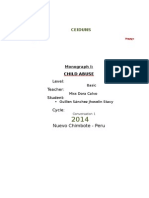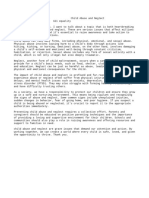0 ratings0% found this document useful (0 votes)
101 viewsEnglish SBA
Child abuse negatively impacts children's education in several ways. It can cause physical and emotional problems like depression or anxiety that interfere with learning. Abused children often have difficulty maintaining good grades and fully engaging in the classroom due to stresses from their home lives. The effects of abuse hinder children's social and academic development and prevent them from reaching their full potential.
Uploaded by
Jahnelle FosterCopyright
© © All Rights Reserved
Available Formats
Download as PDF, TXT or read online on Scribd
0 ratings0% found this document useful (0 votes)
101 viewsEnglish SBA
Child abuse negatively impacts children's education in several ways. It can cause physical and emotional problems like depression or anxiety that interfere with learning. Abused children often have difficulty maintaining good grades and fully engaging in the classroom due to stresses from their home lives. The effects of abuse hinder children's social and academic development and prevent them from reaching their full potential.
Uploaded by
Jahnelle FosterCopyright
© © All Rights Reserved
Available Formats
Download as PDF, TXT or read online on Scribd
You are on page 1/ 2
Focal Point: Child Abuse
Sub Point: How does child abuse affect a child’s education?
Child abuse has become a chronic and widespread problem all
around the world. According to sources in the United States,
approximately three million children are abuse victims annually.
The abuse can be sexual, physical, emotional, or through child
neglect, but abuse, which is sometimes primarily mental or physical,
leaves a deep scar and can have negative psychological and
educational implications for the vulnerable child. It was recognized
that children who are/were being abused have a more difficult time
maintaining good grades in school due to stress from their lives at
home. Abuse is severely hurting the education of various children
which is damaging their conscious development and preventing the
child from not engaging at the proficiency level within the
classroom.
Firstly. child abuse is a form of child maltreatment that
results in physical or emotional harm to the child. Child abuse can
be physical (such as beating), sexual (such as rape), or
emotional/psychological (such as abandonment). Child abuse also
includes neglecting a child’s basic needs such as food, shelter and
medical care. Child abuse may occur in any setting where children
are present including homes, schools, daycare centres and other
institutions for children. Physical abuse occurs when an adult
intentionally uses force against a child causing injury or pain.
Secondly, sexual
abuse occurs when an adult forces a child to engage in unwanted
sexual behaviour by threatening them with violence if they do not
comply; this may include forcing the victim into prostitution or
pornography; it also includes forcing the victim to touch their own
body sexually through masturbation or use of sexually objects.
Child abuse affects the education of children in a number of ways.
The most common is that it can lead to physical and emotional
problems, such as depression or anxiety. Other forms of child abuse
include neglect. This can be done by giving them too much time
away from home or even just being absent. The child may also have
difficulty with social skills, such as speaking or writing.
Lastly, child
abuse doesn’t necessarily only hurts a child’s education, but it
results in severe suicidal thoughts and unfortunate deaths. The older
children grow is the more they demand love, support, and
leadership. Furthermore, they’ll grow to be independent individuals
and positive role models. Failing to supply a child’s basic needs is
understood as neglecting the child. Neglect has also become the
foremost common type of maltreatment.
In
conclusion, school isn’t only simply a place where children go, it’s a
social environment that will further these students with a lifelong
vast of knowledge and education. Abuse is severely hurting the
education of various children which is damaging their conscious
development. The education of abused children isn't a wasted effort,
with proper treatment, help and guidance they're going to become
mature and be successful. Child abuse majorly affects the child’s
education and learning process as they may become depressed and
socially awkward or antisocial.
You might also like
- Generational Shadows: Breaking the Cycle of Parental DysfunctionFrom EverandGenerational Shadows: Breaking the Cycle of Parental DysfunctionNo ratings yet
- Bullying: How to Deal Effectively With Bullying at School (A Guide to Stop Bullying and Help Your Child Recover From the Effects of Bullying)From EverandBullying: How to Deal Effectively With Bullying at School (A Guide to Stop Bullying and Help Your Child Recover From the Effects of Bullying)No ratings yet
- The Bully Blueprint: A No Nonsense Guide to Understanding and Dealing with Bullies.From EverandThe Bully Blueprint: A No Nonsense Guide to Understanding and Dealing with Bullies.No ratings yet
- Monografia Conversacion 2 en Ingles CeidunsNo ratings yetMonografia Conversacion 2 en Ingles Ceiduns17 pages
- How to Beat Bullying at School: Simple steps to put an end to bullyingFrom EverandHow to Beat Bullying at School: Simple steps to put an end to bullyingNo ratings yet
- Guardians Against Bullying: Empowering Communities to Take a StandFrom EverandGuardians Against Bullying: Empowering Communities to Take a StandNo ratings yet
- School Bullying: The Responsibilities of Teachers and PrincipalsFrom EverandSchool Bullying: The Responsibilities of Teachers and PrincipalsNo ratings yet
- Una guía de prevención de bullying y burlas: en salones de clases de pre-escolarFrom EverandUna guía de prevención de bullying y burlas: en salones de clases de pre-escolarNo ratings yet
- Teaching Kids About Bullying: How To Fight Bullying By Teaching Kids Emotional Skills And Social Skills: The Master Parenting Series, #3From EverandTeaching Kids About Bullying: How To Fight Bullying By Teaching Kids Emotional Skills And Social Skills: The Master Parenting Series, #3No ratings yet
- Empowering Children and Teens: Navigating Domestic Violence in Young LivesFrom EverandEmpowering Children and Teens: Navigating Domestic Violence in Young LivesNo ratings yet
- ARTICLE ABOUT CHILD ABUSE by Kagezi NapoleonNo ratings yetARTICLE ABOUT CHILD ABUSE by Kagezi Napoleon2 pages
- Bullying: How to detect, handle and prevent bullying in schoolsFrom EverandBullying: How to detect, handle and prevent bullying in schoolsNo ratings yet
- Child Molesters, Child Rapists, and Child Sexual Abuse: Why and How Sex Offenders Abuse: Child Molestation, Rape, and Incest Stories, Studies, and ModelsFrom EverandChild Molesters, Child Rapists, and Child Sexual Abuse: Why and How Sex Offenders Abuse: Child Molestation, Rape, and Incest Stories, Studies, and Models3.5/5 (11)
- Childhood Abuse and Neglect How Early Sexual and Emotional Abuse Affects Physiological Health, Social and Brain Function in Children and What Strategies to AchieveFrom EverandChildhood Abuse and Neglect How Early Sexual and Emotional Abuse Affects Physiological Health, Social and Brain Function in Children and What Strategies to Achieve5/5 (1)
- Table of Content: Knowledgement Outline Full Essay ReferensNo ratings yetTable of Content: Knowledgement Outline Full Essay Referens7 pages
- English A/B School-Based Assessment (Teacher Approved)No ratings yetEnglish A/B School-Based Assessment (Teacher Approved)19 pages
- The Impact of Islamic Work Ethics On Job Performance With Mediating Role of Intrinsic MotivationNo ratings yetThe Impact of Islamic Work Ethics On Job Performance With Mediating Role of Intrinsic Motivation11 pages
- Heitmeyer Anhut 2008 Disintegration Recognition and Violence. A Theoretical PerspectiveNo ratings yetHeitmeyer Anhut 2008 Disintegration Recognition and Violence. A Theoretical Perspective13 pages
- Why System Lighting Important For Our Office 3No ratings yetWhy System Lighting Important For Our Office 31 page
- Social Media Militates Against Development of Self Discipline For University StudentsNo ratings yetSocial Media Militates Against Development of Self Discipline For University Students17 pages
- Shhhhhhame: Silencing The Family Secret in Sam Shepard's Buried ChildNo ratings yetShhhhhhame: Silencing The Family Secret in Sam Shepard's Buried Child16 pages

























































































